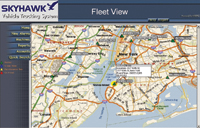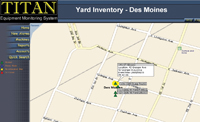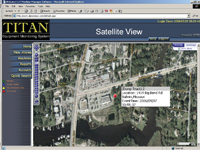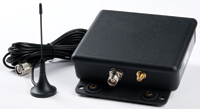
Equipment theft
By Rich Poryako
Features Business Intelligence"We had a Bobcat stolen from us a couple years ago,” explains Aaron Sailer of Star Rentals. The “client” came in and rented the equipment and Star delivered it. “He gave us a credit card and a driver’s licence and the next day when we went to pick it up it wasn’t there. We checked it out and got the police involved but it was gone.
“We had a Bobcat stolen from us a couple years ago,” explains Aaron Sailer of Star Rentals. The “client” came in and rented the equipment and Star delivered it. “He gave us a credit card and a driver’s licence and the next day when we went to pick it up it wasn’t there. We checked it out and got the police involved but it was gone. After we delivered it, they brought a tow truck in, picked it up and took off with it. We weren’t covered by our insurance company, they claimed we gave the customers our product. They didn’t steal it — we gave it to them. So we were out of pocket $40,000.”
|
|
Two years later Sailer received a phone call from a gentleman looking to purchase a Bobcat. Sailer told him that he didn’t have any Bobcats listed on Craigslist at the time. The caller told Sailer that he had just looked at a machine for sale on Craigslist and the stickers had been taken off but he could still see the glue residue and it said “Star Rentals.” Not only that, but when the prospective buyer test drove the equipment, he noticed someone had welded “Star Rentals” onto the back of the bucket.
“The crooks never ground it off!” says Sailer. “This guy on the phone took the serial number off it and went to Bobcat and they said this machine had been reported stolen two years ago. He gave me the address where he saw it and told me ‘you can do what you want with it.’ So I drove down and sure enough; my Bobcat was sitting there. I phoned the police and they came and arrested the guy and gave me my property. The good news is that he put 180 hours on it and it was fully serviced and greased. The oil had just been changed. He really looked after it well!”
Claims falling
Even though these types of stories rarely seem to have a happy ending, the good news is that because of co-operation between the Canadian Rental Association, HED Insurance and Risk Services and the police, these types of fraud claims are way down. In fact, insurance claims as a whole are down in the Canadian equipment and party rental industry.
The better news is that HED recently announced they were actually giving money back to their customers because of a surplus due to the lower number of insurance claims. The first three years of the Canadian Rental Association Protected Self-Insurance Program (PSIP) resulted in a member-owned surplus of $660,369, which was returned to CRA program members in October.
 |
|
| Global Positioning Satellite (GPS) technology has become increasingly common as a method of theft prevention and recovery. Shown here is a screenshot from the SkyHawk Vehicle Tracking System produced by DPL America. It can provide rental operators the ability to track an entire fleet or a single vehicle. |
“All the CRA PSIP members got sent out a pretty good cheque,” says Ken Fingler of HED. Available as a benefit of being a member of the CRA, HED designed their insurance program specifically for the unique needs of Canadian rental operators. “It is a tailored member insurance program custom to the CRA. We insure around 250 members coast to coast and it is growing,” says Fingler. “Just over three years ago, we converted it into a protected self-insurance plan. A portion of the premiums are being held in a reserve pool [from which] day-to-day claims are taken out. If losses are low and we don’t use the reserve pool up, that money can be returned to the members. This is very unusual, because insurance companies typically don’t return money to customers. We needed to build up a reserve just in case there have been claims that may have happened but haven’t been reported.”
HED was having issues with theft and fraud losses a few years ago but they have dropped off recently. “We’ve done a number of bulletins out to our customers informing them about scams and reminding them about things to watch for and about checking photo ID,” says Fingler. “Every once in a while, a company will get caught by someone who uses inside information such as a legitimate customer’s PO to rent a big piece of equipment delivered to a construction site. The rental operator will drop it off and it’s gone. Those kinds of things happen occasionally but they have gotten a lot better.”
 |
|
 |
|
| Two screenshots from the TITAN Vehicle Monitoring System, also produced by DPL America. On the top left, a single map displays all of an operator’s equipment and truck locations at once. On the bottom left, a red unit indicates an unauthorized use alarm. The map may be zoomed in to the street level for faster theft recovery. |
“Theft is still hitting us here and there but luckily not in big numbers. In the last five years we’ve had about 30 theft losses reported for a little over $500,000 worth of equipment.” A good portion of that theft is usually from construction sites. “Rental operators are adding more controls into their rental agreements; putting more responsibility on their customers to secure their equipment properly. Companies tend to watch a little closer when it is coming out of their own pockets. Otherwise, quite often the end user won’t secure rented equipment at the end of a shift.”
Fingler adds, “We cover it for the rental dealer so they can replace that equipment right away and get it back out in the field generating revenue. We will then try to recover the money from other parties including the contractor or the contractor’s insurance policy. Many of the contractors are getting better at construction site security with improved fencing and hiring security staff. Most insurance policies won’t cover losses off premises, which is another reason why we developed the insurance program for the rental industry because the coverage wasn’t available.”
For the most part, party dealers don’t have a high rate of theft insurance claims. Although their products can be high value, they aren’t typically salable items; however, as Fingler explains, “a couple years ago we had a few party rental companies hit with theft of aluminum tent poles where thieves were cutting up the poles and selling them as scrap.” Most criminals are looking at items such as generators, mini skidsteers, front-end loaders and booms. “They often end up at small contactors that are working in remote areas who will buy anything for a cheap price,” says Fingler.
“We still get break-ins, but the rental yards are getting better with security. We provide complimentary safety and security inspections where we provide recommendations on how companies can remove hazards and reduce risk, which may include video surveillance deterrence and physical security systems including better fencing,” says Fingler.
 |
|
| The TITAN system. It certainly doesn’t present an impressive face, but systems just like this one have saved companies thousands of dollars otherwise lost to theft.
|
Keeping it under lock and key
Not only is locking extended lifts in the air an easy marketing promotion, it also makes it very difficult to move the equipment. “It has been working well; claims have been holding steady at a low rate. With the economic crisis we were actually expecting more thefts and luckily it hasn’t materialized as much as we thought. It does manage to still happen though, so it is important to have a way of being able to identify the product. The police recover a lot of stolen equipment but the problem in the past has been identifying the legal owner.”
Fingler adds that, “More and more operators are also putting GPS locators on their equipment so they can be tracked and located. We had one stolen out of Ontario and it was tracked to Montreal the next day.”
Sure, this is great news, and getting money back is even better; however, it is important to remain vigilant. Before you let your guard down, keep in mind that theft remains the biggest source of claims for HED and many scams go unreported as most operators have taken higher deductibles, from $2,500 to $10,000, to lower their insurance premiums. Instead of getting burned (again), be proactive and reinvest your insurance savings by upgrading your security program. You do have a formal, written security program, don’t you?
*Rich Porayko is a professional writer and founding partner of Construction Creative, a marketing and communications company located in Metro Vancouver, B.C. richp@constructioncreative.com
| Big $ = Big target
According to a 2008 study commissioned by LoJack Corporation, newer and higher-end items tend to be stolen the most often, as professional thieves are primarily concerned with resale value. The study indicated that the types of equipment most frequently stolen are (in order):
The fact of the matter is, though, that no one single source has a good handle on exactly how much equipment goes missing in Canada every year. In the United States, the National Equipment Register serves as a public database of heavy equipment thefts, allowing consumers an easy option to see if the equipment that seems like such a great deal is property belonging to someone else.
The key to theft prevention isn’t to make things impossible for the thief, but to make stealing from you such a challenge that it isn’t worth it. Below are a few tips you can use to help get your business to that point: At your site…. On the job… Everywhere… |
Print this page